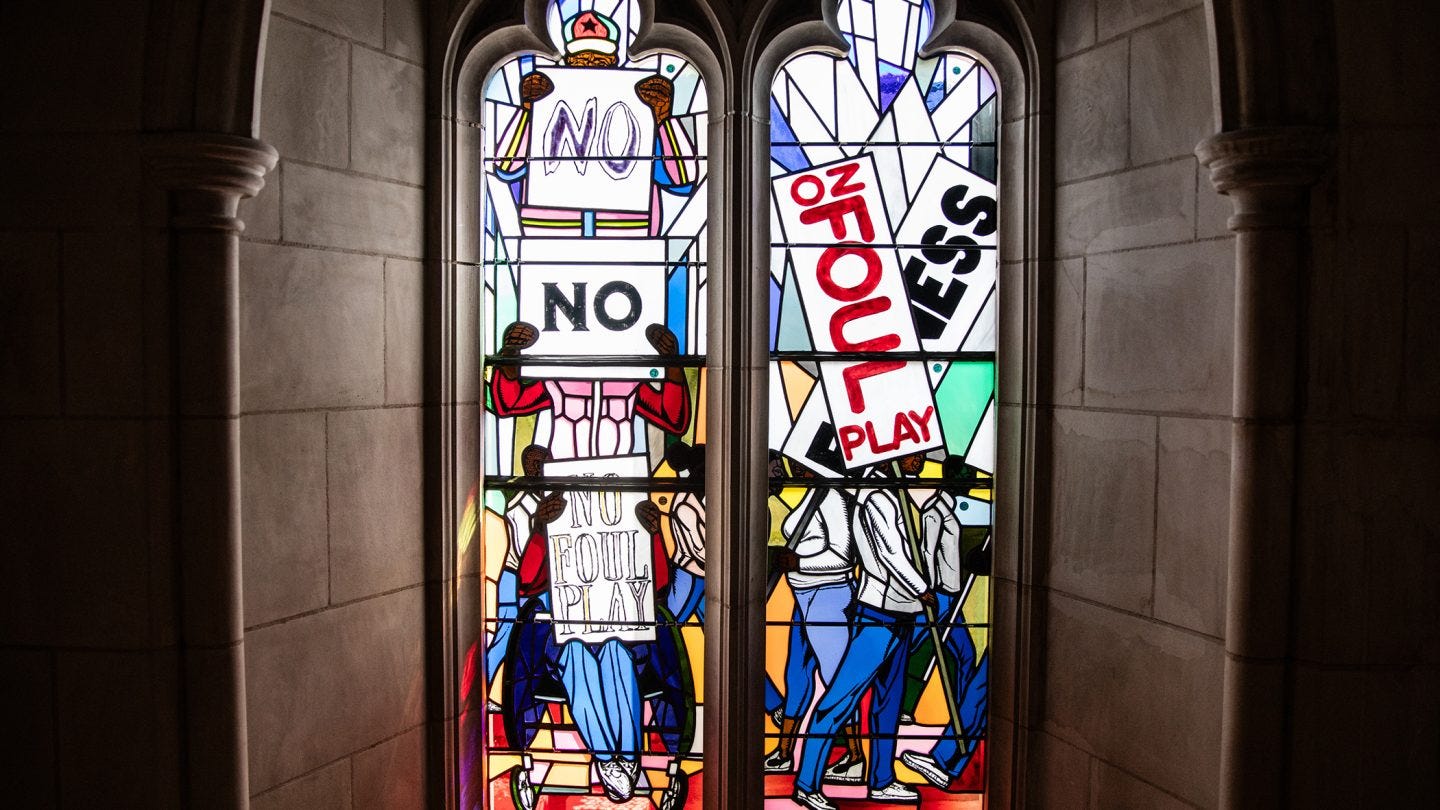The Loss of America's National Church
Roundup of an interesting conversation.
Greetings,
Earlier this Sunday, I had another conversation with Alvin H. This was our sixth, and I’m surprised we had gotten this far. But the bigger surprise is how the conversation unfolded. The topic for our conversation is the recent assassination attempt of presidential candidate Donald Trump. If you want to give it a listen, here it is:
As a side note, since Alvin had been setting up these chats, I would appreciate it if readers give his Substack a look:
Now let us move on…
To be honest, I wasn’t all that bullish on this particular topic. I’m not sure if there’s anything I could have said that hadn’t been said before. But as it turned out, we were able to do that.
Around the 38-minute mark, the topic turned into America and her loss of a “national church”. So this conversation became a sequel of sorts to my previous article:
Istiqlal Mosque: Indonesia's National Church
My tour through the religious landmarks of Central Jakarta.
In the article linked above, I referred to Istiqlal as the “national church” of Indonesia. In addition, I claimed that for the United States, the Episcopal Church fulfills that role. This is important because that means America is (was?) a protestant nation.
One of the most enduring narrative I have heard about America is how it’s not a “Christian nation”. The First Amendment is often used to justify this claim:
Congress shall make no law respecting an establishment of religion, or prohibiting the free exercise thereof.
Another evidence for this claim is the Treaty of Tripoli written in 1796:
As the Government of the United States of America is not, in any sense, founded on the Christian religion.
But this argument is a misunderstanding of how certain protestant sects understand the proper relationship between church and state. For many protestants, the role of the government is not to enforce the rights of the Church. Rather, they want the government to get out of the way.
This isn’t surprising to those familiar with American history. The Puritans who founded Massachusetts (and by extension, New England as a whole) did so in an attempt to get away from the Church of England. And going further back, Protestantism at its core was a rebellion against the authority of the Catholic Church over Western Europe.
All this is to say that the American understanding of “separation of Church and State” or “religious freedom” is only possible through the lens of Protestantism; by that I mean American Protestantism. And the expression of American Protestantism? The Episcopal Church, the church of George Washington.
I understand if this might sound strange given how small Episcopalianism is at the moment, so I will quote my previous article:
Being the “national church” doesn’t necessarily mean a religion will have the most adherents in said country … the Episcopal Church still has a special place and history within America. Four presidents have been buried in the National Cathedral in Washington, DC and many funerals of prominent American figures were held there.
But as I said in my article on Istiqlal and on the video with Alvin, mainline protestantism had collapsed in the US. The Episcopal Church in particular, was hit very hard. I remember when I visited the National Cathedral a few years back, before my conversion to Catholicism; it was beautiful, so beautiful that my dad talked of going there on Sundays. He said this even though the place was about an hour away from where I lived at the time. Unfortunately, the National Cathedral is all style but no substance.
I don’t think it’s uncharitable for me to conclude that the people who run the Episcopal Church no longer believe in Christianity. Just take a look at this stained glass window in the National Cathedral:

What’s wrong with this picture? Allow me to take it straight from the horse’s mouth (bolded emphasis mine):
The Cathedral’s Now and Forever Windows capture the resilience, faith and endurance of African Americans and our nation’s struggle with the original sins of racism and slavery.
The original sins of racism and slavery?
I’m not saying the things done to Black Americans back in the day weren’t evil. They were. That said, calling them “original sins” is such a religious faux pas that I can’t believe no one caught it before it was posted in the National Cathedral’s own website. I mean, that stained glass window was bad enough.
No, seriously. If you want to see how stained glass windows should look, go on to Scoot’s Stained Glass Catechism. There, you can see how it’s done, and I’m not just saying it because I’m a Catholic.
That said, I will be fair and admit that all was not well even before this. To further quote the National Cathedral’s website:
The new windows and poetry grew out of a decision in 2017 to permanently remove windows that honored Confederate Generals Robert E. Lee and Thomas “Stonewall” Jackson.
Speaking as someone who admires the honor and tenacity of the American South, I would have found those windows cool from an aesthetic standpoint had I seen them. But that doesn’t make them any less of a religious faux pas. Actually, scratch that. They were a little less of a faux pas since they didn’t refer to what happened to the South after the Civil War as the “original sin of Reconstruction”.
Anyways…
The point is that the Episcopal Church serves (used to serve?) as the barometer of acceptable thought in America. Before, the Southern generals were honored; now they were pariahs, traitors to the nation. And worst of all, they committed the original sins of racism and slavery.
But as I said before, mainstream protestantism had collapsed. While I did say that a national church doesn’t have to be the majority religion of a country, it must have some degree of respectability. But nowadays, the Episcopal Church is a joke. Whenever serious Christians talk of Episcopalianism, it’s usually done in a derisive way, in reference to how compromised it was by modernity.

As I said before, America is a protestant nation and Episcopalianism is her national church. So the destruction of mainline American protestantism meant the loss of a functional national church for the country. The result? Americans don’t know how to act anymore. They no longer know the boundaries of appropriate behavior.
In the video, Alvin and I talked of the lack of civility in American politics now. People on the left (and the anti-Trump right) want to blame Trump for that. But I remember when President George W. Bush was suffering from what conservatives referred to as the “Bush Derangement Syndrome”. Now to be fair, Obama was also a target of personal attacks from conservatives. But going back to Trump, he was probably the one person to have gotten the worst of this politically-based vitriol.
But it’s not just the people in power that was targeted. This brings me to cancel culture, the idea that if you hold the wrong ideas or support the wrong person, you deserve to have your lives ruined, even if you’re a private citizen with no political presence. Cancel culture used to be associated with the left, but in the eve of Trump’s assassination attempt, the right also got in on the act - in the form of Libs of TikTok getting a Home Depot employee fired for expressing regret that the would be assassin had missed Trump.
I can already hear the excuses of “they did it first” or whatever. I don’t care. I didn’t write this post to judge Chaya Raichik or those who tried to justify what she and her ilk did and wants to do in the future. Rather, I wrote this article to trace the trajectory of how the collapse of a national church in America led to violence (literally and figuratively).
That said, the seeds were always there. Going back to my original video, Alvin talked about how America is all about individualism now. Of course, American culture had always been individualistic and had little reverence for authority. I brought this up because truthfully, I’m not necessarily against a moral authority determining the boundaries of acceptable discourse. Librarian of Celaeno put it best in his article on the subject of cancel culture:
I am not a believer in universal free speech. Given the power, I would ban people who espoused such malignant ideas from any participation in public life. As a Christian monarchist, I hold that the job of a ruler is to prevent just those sorts of social evils from gaining currency.
Indeed. A moral authority who can ban those who “espoused such malignant ideas from any participation in public life” would be a good thing. But the keyword here is authority.
For rulers are not a terror to good conduct, but to bad. Do you wish to have no fear of the authority? Then do what is good, and you will receive its approval; for it is God’s servant for your good. But if you do what is wrong, you should be afraid, for the authority does not bear the sword in vain! It is the servant of God to execute wrath on the wrongdoer.
-Romans 13:3-4 (NRSVCE)
To put it another way, it is the job of the prince (read: the legitimate authority) to execute God’s wrath on the wrongdoer. It’s not the job of some random Joe on the street to pick up a gun and take the law into his own hands.
And it’s not yours either. Yes dear reader, that means you.
Until next time, Michael P. Marpaung








